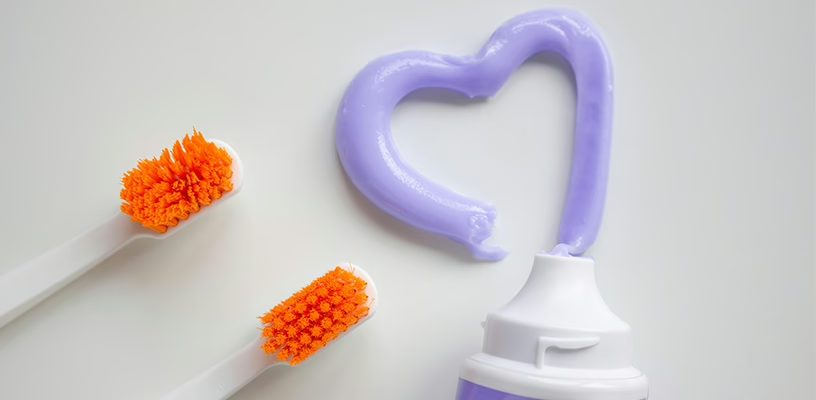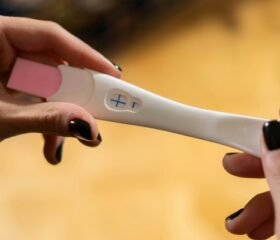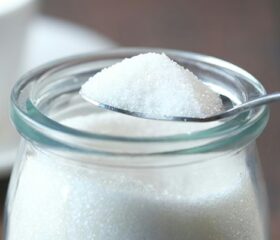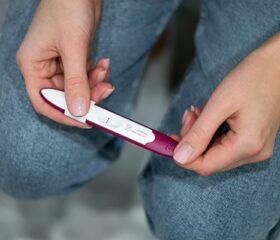Does the Homemade Toothpaste Pregnancy Test Really Work?
If you’re looking for nontraditional methods of checking whether you’re pregnant, you may have encountered the idea that you can use toothpaste to tell if you’re expecting.

If you’re petrified of running into someone you know in a checkout line with a traditional pregnancy test in your hand, this might sound tempting, but is there any truth to the rumor that toothpaste can tell whether you’re pregnant? Read on to separate fact from fiction.
What is the toothpaste pregnancy test?
The premise of the toothpaste pregnancy test is straightforward. You take a small amount of toothpaste (preferably plain white toothpaste) and add a few drops of your urine. Then, after you stir it all up, a change in color or fizzing indicates a positive result (pregnancy).
Simple, right? Not so fast.
What is the supposed science behind the toothpaste pregnancy test?
Supporters of the toothpaste pregnancy test believe that the composition of a pregnant woman’s urine causes a reaction with the toothpaste’s chemicals.
Specifically, they point to the presence of the pregnancy hormone, human chorionic gonadotropin (hCG), as the culprit behind the resulting foam or color change. 1
Does the toothpaste pregnancy test have any scientific validity?
Here’s the problem: there’s no evidence that the toothpaste pregnancy test works. Unfortunately, it’s just a myth.
The reaction (or lack thereof) that toothpaste has when mixed with urine has nothing to do with whether hCG is present in it. Instead, it depends on how acidic or basic your urine is.
Urine can either be slightly acidic or neutral, with a pH of 4.6 to 8.0. This concentration fluctuates from person to person based on factors like health, medication use, and diet. 2
Depending on your urine’s pH, there’s a chance it will set off the calcium carbonate in most toothpaste. The reaction is the same one that powered the baking soda and vinegar volcano your middle school science teacher showed you, and it has absolutely nothing to do with pregnancy.
Other fake pregnancy tests
The toothpaste pregnancy test is just one of several purported DIY testing methods. For instance, you can supposedly also test for pregnancy with salt, sugar, and bleach.
All of these methods have something in common: they don’t actually work. The only real way to check for pregnancy is to use a legitimate, store-bought test. Unfortunately, you can’t use substances you happen to have sitting in your pantry.
What are reliable alternatives to the toothpaste test?
At the end of the day, toothpaste simply doesn’t have the hCG-reactive agents that are used in either home pregnancy tests or doctor-administered tests. These pick up on the hCG hormone spikes that the placenta delivers throughout a pregnancy.
Fortunately, these tests are widely available and usually quite affordable. Your options are:
Home pregnancy tests
Over-the-counter home pregnancy tests are staples at most pharmacies, grocery stores, and online retailers. They’re also easy to use. You must follow the instructions carefully and wait the appropriate amount of time (usually just a few minutes) before checking the results.
For the most accurate results, take the test after you miss your period, when your hCG levels are higher. Mornings are also best; your urine will be especially concentrated and carry more detectable hCG right after you wake up, since you won’t have had any water all night. 3
Can home pregnancy tests be inaccurate?
Home pregnancy tests are usually about 99% accurate. 4 However, mistakes can still happen.
It’s rarely the case that your pregnancy test was simply a dud. What’s more likely is that:
- You took the test too early: If you’re in the early days of pregnancy, your hCG levels may be too low to show up on a test. 5
- Your urine is too diluted: Go easy on the water before testing. You don’t want to risk a false negative result by diluting your urine. 6
- You misinterpreted the results: If you didn’t carefully read the instructions, peed in the wrong place, or looked at the wrong line, you could easily misread the results.
If you see a faint line on your pregnancy test, it usually means that you’re pregnant. However, if you’re not sure whether your result was accurate, your best bet is to wait a few days and try again. Remember to take the test first thing in the morning and follow the instructions exactly, whether you’re using pregnancy test strips or digital tests.
Doctor-administered pregnancy tests
If you trust a doctor more than the health aisle at the grocery store, your physician can perform either a urine test or blood test to see if you’re expecting. Since blood tests are more sensitive, they can spot pregnancy earlier than urine tests, sometimes as early as 6–8 days after conception. 7
Two types of pregnancy blood tests are available. A “qualitative” hCG test indicates the presence of hCG, while a “quantitative” hCG test measures the exact level of hCG in the blood. The latter version helps monitor early pregnancies and spot potential complications. 8 9
Signs you might be pregnant
The only way to confirm you’re pregnant is to take a legitimate test. However, there are several early pregnancy symptoms that can also tip you off. These include the following: 10
- Missing your period
- Nausea and vomiting (morning sickness)
- Breast pain, tenderness, or swelling
- Fatigue
- Frequent urination
- Changes in appetite or food cravings
If you experience any of these symptoms, especially in combination, you should take a reliable pregnancy test or call your doctor.
Final thoughts
As much as some people want to believe in DIY pregnancy tests like the toothpaste test, some experiments should stay in the tube.
Something this important is worth a trip to the drugstore or a doctor—you’ll be grateful for the peace of mind given by a reliable pregnancy test.
Article Sources
- Canadian Cancer Society. "Human chorionic gonadotropin (hCG or b-hCG)" Retrieved May 8, 2025.
- University of California San Francisco Health. "Urine pH test" Retrieved May 8, 2025.
- Willow Womens Center. "Understanding the Proper Times for a Pregnancy Test" Retrieved May 8, 2025.
- Planned Parenthood Federation of America, Inc.. "Pregnancy Tests" Retrieved May 8, 2025.
- MedlinePlus. "Pregnancy Test" Retrieved May 8, 2025.
- Clearblue. "What can affect a pregnancy test result?" Retrieved May 8, 2025.
- Lifeline Urgent Care. "How Soon Can a Blood Test Detect Pregnancy?" Retrieved May 8, 2025.
- Mount Sinai. "HCG blood test - quantitative" Retrieved May 8, 2025.
- MedlinePlus. "HCG blood test - qualitative" Retrieved May 8, 2025.
- American Pregnancy Association. "Early Signs of Pregnancy" Retrieved May 8, 2025.







